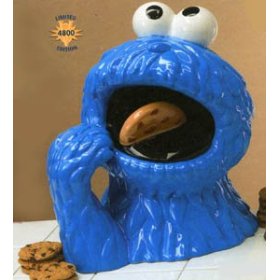Cookie Monster, the lovable Sesame Street character who gobbles up cookies by the fistful, is an adorable furry creature. Of course, he’s a puppet, a toy – he never gets fat, and he’s blue to boot.
 Gift Monsters, on the other hand, are our very real children who consume presents and toys – whether expensive or not – as carelessly (and copiously) as Cookie Monster does cookies.
Gift Monsters, on the other hand, are our very real children who consume presents and toys – whether expensive or not – as carelessly (and copiously) as Cookie Monster does cookies.
And they’re not cute at all.
How The “Gimme” Syndrome Starts
Table of Contents
With our competitive and consumer-oriented society, expectations are set young.
Think about it: birthday parties for three-year-olds that include dozens of tots in rented venues and live entertainment are not unusual. The birthday child receives not only all of those gifts but often has separate family-only celebrations getting a whole other set of gifts.
Nip It or Lose It
Unless you want your future eight-year-old to be miserable when he’s without the very latest gadget or highest number of that season’s “must-have” toy, preschool parents need to teach values and limits while their children are still very young. Instead of buying several expensive gifts for your birthday baby, for instance, limit gift-giving to one from each couple – mommy and daddy; grandma and grandpa; and a group called The Cousins (especially helpful when you have a large extended family to deal with).
Because toddlers simply enjoy the act of tearing the wrapping paper over and over again, you may want to have several smaller items (such as hair bands or socks) wrapped separately for the squeal factor.
If the one-present approach is just too limiting for a doting nana, why not begin a college-fund bank account? Similarly, you could suggest that any extra gift-giving money be put towards something that your preschooler would use but not necessarily deem a “gift”. This might include anything from new wallpaper to a large whiteboard or adorable toddler-size bed.
Teaching Charity
Teaching preschoolers to give to those less fortunate than themselves needs a little planning on the part of the caregiver. Certainly, the most rewarding method is to directly give a present to a child who might not otherwise get much (whether for a birthday or during the holiday season). However, there are many organizations that can help you involve your preschooler in giving – from the church to playgroups and neighborhood community centers, donations are usually welcome.
By spending time together in planning the event (ie., making up little party favors together or drawing pictures of balloons to decorate your living room walls), your own presence becomes a gift that will be remembered long after the toys are discarded. Explaining why we celebrate certain days or times of the year is another special activity that doesn’t require gifts – children delight in hearing stories of their birth. Living simply and focusing special days on family and a few close friends instead of piles of presents may forever keep your preschooler from turning into a Gift Monster.
